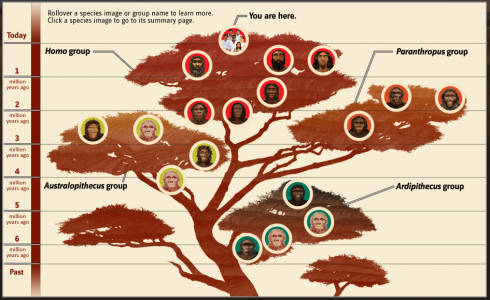In a recent paper ("On the antiquity of language: the reinterpretation of Neandertal linguistic capacities and its consequences"), Dan Dediu and Stephen Levinson
argue that modern language was a feature of both Neanderthals and modern humans, and therefore of our common ancestor as well. This takes their date for the origin of language to around 4-500,000 years ago at least, far beyond the common (though what I consider as very conservative!) view that language emerged around 100,000 years ago.
 |
Illustration of hypothesized dates and
communication systems, shown alongside
tool technologies and hominin species |
Whether or not Neanderthals had complex language, or any form of complex communication system such as a protolanguage, has been debated for decades. More and more though, the evidence seems to bolster the idea that our very close cousins were more similar to us than the classical brutish view, both cognitively as well as behaviourally.
In my previous post "
Are we being a bit unfair to Neanderthals?", I discussed the tendency for people to be quite negative when thinking about Neanderthals, to compare their culture to more modern examples of our own, and scorn them as "the other" - languageless, dumb, and trying-to-be-human-but-not-quite-getting-it. It's an unbalanced view, when humans and Neanderthals had broadly similar behavioural and cultural signature in the record,
especially when you look at contemporary examples in the record.
Some might say that the classic image of the Neanderthal has had a makeover - we now know that sometimes, some of them buried their dead. Sometimes, some of them pierced teeth or shells, and used red ochre and black manganese as colourants. Often, they made beautiful stone tools with great skill and knowledge of flint working. Sometimes they interbred with modern humans.
But still, the nul hypothesis for some has remained that Neanderthals are crap versions of humans.
Equally, if you are going to attribute intelligence to a species, don't you also need evidence to attribute them with a lack of intelligence?
Now, with evidence of interbreeding between the species, and the Neanderthal genome sequenced, it's harder to think of Neanderthals so simply as 'the other'. Dediu and Levinson's article doesn't contain the Neanderthal racism I often find myself complaining about.
Most interesting and unique about their article is the implications for studying language evolution and linguistics, suggesting for example,
the present-day linguistic diversity might better reflect the properties of the design space for language and not just the vagaries of history, and could also contain traces of the languages spoken by other human forms such as the Neandertals.
It's a great article synthesizing lots of relevant information on Neanderthals as well as language origins research, and I recommend it as a good read for anyone with an interest!












